Children of America’s opioid epidemic
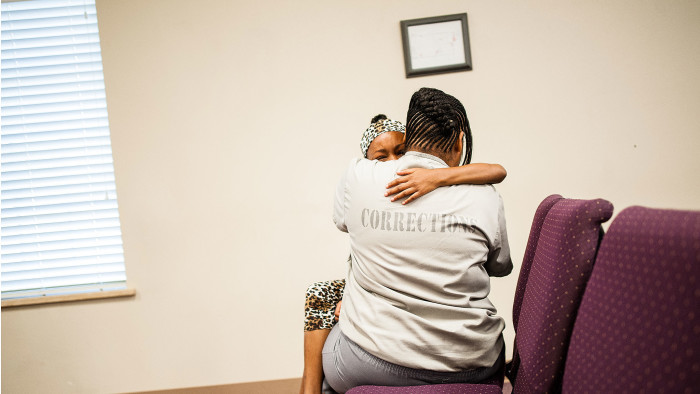
Roula Khalaf, Editor of the FT, selects her favourite stories in this weekly newsletter.
Shamari calls the area she lives in “medium Tulsa”. It’s not quite the Hispanic east or white midtown or the black north side, it’s somewhere in between. A landscape of car dealers and wholesale outlets, storage units and by-the-week motels, like the one where she lives with her little sister Shania, her 22-year-old cousin Destaney and Destaney’s two young children. It is an area that exists to service impermanence, the state in which Shamari has lived much of her young life.
It is the summer before Shamari, aged 11, enters fifth grade. She had to repeat the third because “no one helped me with my work”. Shania, nine, is in fourth. The girls have gone to five different schools in their short lives. They’ve lived in as many different houses, or more — they’ve lost track. Their peripatetic lifestyle is common among children whose parents struggle with drug addiction and have been to jail.
Children like Shamari and Shania are more likely to struggle with addiction themselves, along with poverty, abuse and bullying. Their mother Tracie was, until recently, one of the estimated 2.6m Americans with opioid addictions. The family has been consumed by both of the major drug epidemics that have swept America in the past 30 years — first crack cocaine and now opioids, which include prescription painkillers as well as harder drugs such as heroin.
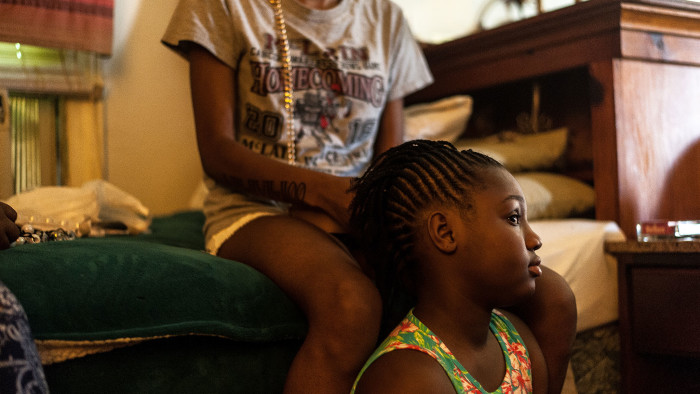
Addiction and its side-effects have passed through four generations of the family. The girls’ septuagenarian great-grandmother, Nanny, had six children, all of whom have been, or still are, on drugs or in prison. She was an alcoholic who sold drugs and spent time in jail, according to her daughter and grandchildren. One of her husbands was addicted to heroin.
Nanny’s children, in turn, had 15 children — though there is disagreement in the family as to whether it might be 16 or 17 — all of whom dealt with the fallout of their parents’ problems and nearly all of whom eventually ended up addicts themselves, selling drugs or imprisoned for some combination thereof. The kids in Shamari’s generation range from toddlers to young adults and Destaney is trying to ensure they stay out of trouble.
Destaney lives in constant fear of the twin menaces of addiction and incarceration. “We talk about it all the time, like we have to just go to school and get our lives on track, because all this is already stacked against us,” she says. Shamari doesn’t like to talk about it at all. “I’m bored,” she says when the question is raised.
Sheila Harbert runs eastern Oklahoma’s Girl Scouts Beyond Bars programme, which takes children to see their mothers in prison. She says the majority of the women in jail in Oklahoma, which imprisons more women than any other state, are there for drug-related crimes. “Once [the mother] is taken out of that home, the home becomes a shambles,” she says. “When she goes to jail she needs to find someone to watch that child or they end up in the system.”
Destaney spent her life bouncing between foster homes, youth shelters and relatives’ homes while her mother was in prison or strung out on crack or pills. “My mom was on drugs, so I know how that goes,” she says. “She’s been clean for a year and a half, but she still has the urge to steal — she’ll steal your whole purse and then blame it on the kids.”
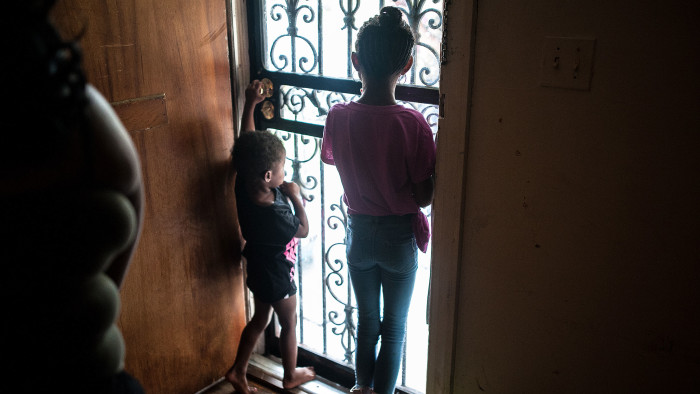
During some of her mother’s stints in prison or on the streets, Destaney was looked after by Shamari’s mother, Tracie. So, after Tracie went to prison in 2015, Destaney took Shamari and Shania in rather than see them sent into the foster system. “They already lost their mom, lost their dad to the streets because he’s a drug addict — that’s too much for them to go through,” she says. “I said, ‘Send them with me because they won’t be going to foster care’.”
America’s drug problem is not new, but the opioid crisis has taken on new urgency. A recent survey of its members by the insurer Blue Cross Blue Shield found that the number of people diagnosed with opioid addiction — from both legal and illicit drugs — rose nearly 500 per cent between 2010 and 2016.
The annual total of fatal overdoses involving prescription opioids quadrupled between 1999 and 2015, according to the US Centers for Disease Control and Prevention. Drug overdoses are now the leading cause of death among the under-50s, surpassing gun deaths and car accidents. In August, president Donald Trump declared the issue a national emergency, but his administration has yet to direct government resources toward the problem beyond a previously established national commission.
Tracie, speaking from the Dr Eddie Warrior Correctional Center, a minimum-security women’s prison an hour outside Tulsa, says that, like many Americans, her addiction began with a medical prescription — a government study found nearly 92m US adults, or 38 per cent of the population, took a prescribed opioid in 2015. She and the girls’ father, Shamon, both got hooked on Lortab, a painkiller containing the opioid hydrocodone, after she saw a doctor following a car accident. That doctor, and others, continued to prescribe the pair pills for various chronic pain issues for years.
Tracie ended up in prison after being arrested for drunk driving while picking up her son and his cousins from a roller-skating rink. She was still on probation for a charge of marijuana possession. She was ordered to attend counselling but relapsed and decided she could only kick the habit in jail. She expects to be released next spring.
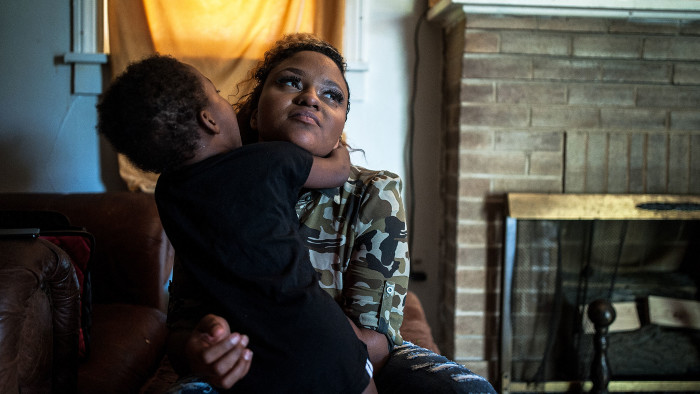
Destaney’s motel room is a two-bedroom duplex. She and the four children — Shamari, Shania, five-year-old Kimani and three-year-old Serenity — moved in this May. The rent is $476 a week — more than twice what Destaney paid for the three-bedroom house she was living in when she took the girls in nearly a year ago. But her landlord didn’t like the idea of two extra children in the house and evicted them all in January. They moved in with Tracie’s sister Vanessa — whom everyone calls Donut — for a while. Barely three months later, they moved into the motel.
By then, Destaney had quit her job at a call centre — it was the only way she could take care of the children. As a result she no longer has the job that she would need to prove that she makes more than three times the rent in income that most local landlords require. So the family is stuck in limbo — a predicament familiar to the chronically poor in America. She pays for the motel by credit card and is approaching her $6,000 limit. She receives a $735 monthly disability cheque for Kimani, who is developmentally disabled, and food stamps for all the children. Destaney had to call the Department of Human Services for Shamari and Shania’s food stamps after she discovered their father was selling them to buy drugs. Oklahoma is among the least generous states in the country when it comes to public benefits, according to a recent study by the Urban Institute.
“They want to do piano lessons and they want to take all types of [classes], and I just applied for a higher-paying job — because I want to make that happen for them,” she says. “They deserve it.”
At their grandmother’s cramped house on the edge of north Tulsa, Shamari and Shania are getting their hair done by a cousin in preparation for a visit to the prison to see Tracie. They travel there on a bus provided by the Girl Scouts, an organisation that has helped introduce some stability to their lives.
Sugar Momma — as their grandmother is known — runs an informal sweet shop from the front room of her house, and the girls raid it all weekend. There is a towel slung through the hole where the doorknob should be. Sugar Momma was in prison for 10 years between 1985 and 1994. She was released on parole for a while, got pregnant and ended up back in jail. She had her youngest child, Donut, inside.
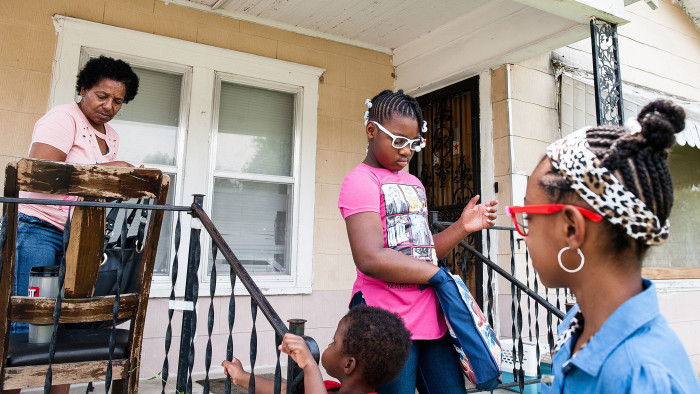
Her short-term memory has been bad since she had open-heart surgery a few years ago. She will sometimes nod off to sleep while cleaning something on the floor or fixing false eyelashes for one of her granddaughters, or just standing around telling a story. She has a basket overflowing with orange prescription bottles next to her bed and she’ll periodically take a pill from one, often the anti-anxiety medication Xanax.
Sugar Momma and Tracie don’t have much of a relationship. But Sugar Momma re-entered the girls’ lives a few weeks ago, offering to help Destaney out. The girls are wearing fake glasses with plastic lenses that Sugar Momma bought them.
“We love them,” Shania says.
“Me and Nia, we both need glasses,” Shamari adds.
“I got so many words wrong at the doctor,” says Shania, brightly.
The Girl Scouts bus rolls past scrapyards and Amish country stores in Muskogee County; past a prefab home lot, the Little Secrets Adult Store and the Disabled American Veterans post; past churches and rehab centres.
“I’m excited because I get to see my momma,” Shamari says. “I have to tell her something really important.” She doesn’t want to reveal what that is though.
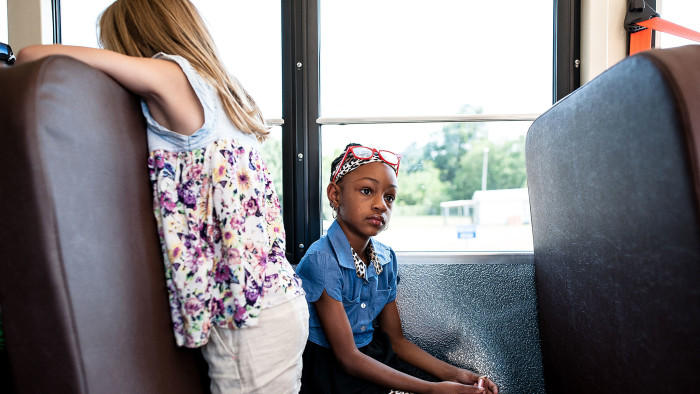
Shania says she wants to make a potion that would stop bullying and “one that would help people getting out of jail start over”.
The girls talk about themselves. Shamari has never been on an aeroplane. She isn’t sure how she knows it, but she knows people in Paris kiss their fingers. She has recently started thinking the name of the retailer Dick’s Sporting Goods is hilarious. She likes to “buzz out” a lot — that is, pop in her earphones and watch YouTube videos on the iPhone 4 that Sugar Momma gave her. She squints to make out the figures on its shattered screen. She once liked a boy named Cooper, but he didn’t like her back.
At the prison, the mothers and their children gather in the chapel. The Girl Scouts arrange lessons for each visit. This one is a scavenger hunt to help the children and their mothers learn more about themselves and each other.
“Can you guess what my favourite thing about me is?” Tracie asks the girls.
Shamari looks up at her mother: “Us?”
“No. Well, it’s about me,” Tracie says. “But I love my kids. My favourite thing about me is my birthmark. It’s special.”
The girls are excited all the way home on the bus. “I wish my mom was already home, but I gotta wait till 2018,” Shamari says. “But when she gets out we’re gonna have a big dinner and we’re gonna cook it!”
Shamari and Shania are the last two left after all the children have been picked up. Sugar Momma didn’t show up and isn’t answering any calls, so Miss Jackie from Girl Scouts drives them to her house. No one answers the door, or the window, when Shamari knocks on it. The television is on inside and one of Sugar Momma’s dogs is running down the street barking. After 15 minutes, Sugar Momma emerges. She was sleeping.
Dusk is falling on medium Tulsa when Donut, who works as a home caregiver, drops in at the motel. She and Destaney sit by the small motel swimming pool, while the children splash around. The Broken Arrow Expressway roars just over the fence. Shamari shrieks and laughs, with Serenity riding on her back into the deep end. They jumped in fully clothed — they could barely contain their excitement.
Destaney and Donut are making a plan for Destaney and the children to move back in with Donut, who needs help with her rent.
The plan is that the girls will change schools again and go back to Union, a school they attended three years ago. Tracie had spent some time in jail when they were last at Union. “It was a very short jail time,” says Shania. “My mom came to pick us up as a surprise — and we thought she was in jail still!” says Shamari.
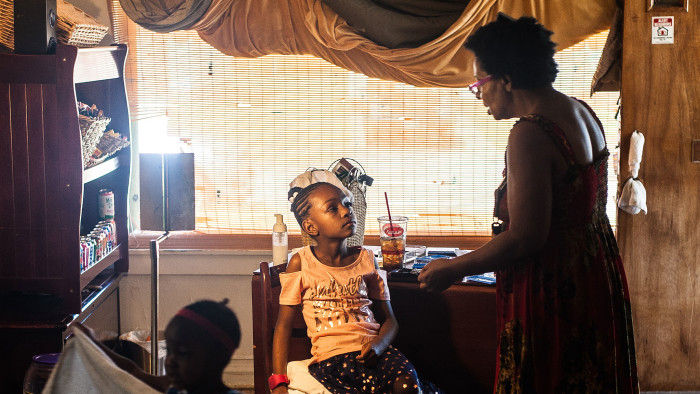
Donut and Destaney talk about their lives. Donut about being born in prison, and how it felt not seeing Sugar Momma for years at a time. “You’re angry,” Donut says. “You wake up every morning and you think, why me? Why me? You look at other people and they have everything that you don’t.”
She talks about getting breast reduction surgery last year and how her mother begged her to hand over her pain medication. Eventually, despite the pain, she did. Destaney talks about the creepy foster brother who tried to touch her, the kids at school making fun of her for being “shelter girl” and the three months when she ate her lunch in a bathroom stall to avoid their mockery. The time her mother stole the painkillers she had been given after her C-section. Destaney wasn’t taking them anyway, despite the pain, because of her fear of addiction.
“We didn’t have no childhood — we just had to grow up,” says Donut.
“I wasn’t even allowed to be a kid,” Destaney says.
It’s getting dark and the girls head back to the motel room to take a bath and give the little ones theirs. “They ain’t even been parentless for that long,” says Donut, more matter-of-fact than envious. “They see their momma, what, twice a month? I didn’t see my mom for three years, more. They haven’t actually been through anything — they got it pretty good, I think.”
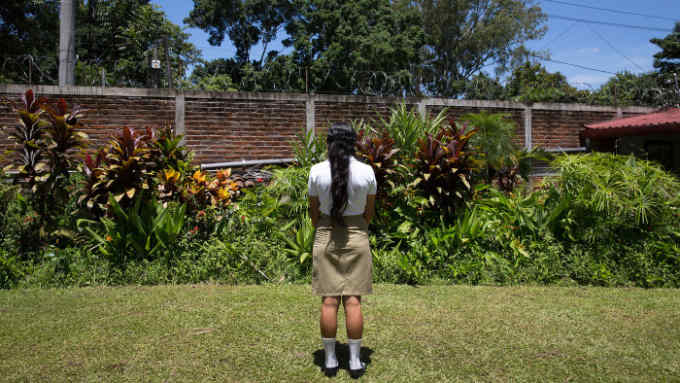
Comments